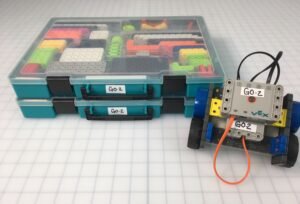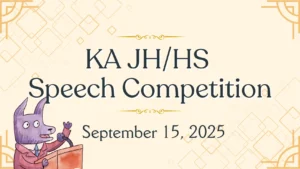Enjoy this short video snippet about Global Indian International School from our 2024 Expo.
Transcript
Global Indian International School
ISTimes Global: (00:00) Hello, we’re with Ritika here with Global Indian International School. Hello. Welcome.
Global Indian International School: (00:05) Hi. Hi. Thank you so much.
ISTimes Global: (00:07) Uh we were just chatting about your school and uh I I was surprised to know that you have been in uh Japan for so long. So you have such a strong presence here. Um I would love to know more about your school and uh I you also had mentioned that you start all the way from three. So please uh tell us tell us
Global Indian International School: (00:28) Sure. Sure, sure, sure. So our school is around 17 to 18 years old. We are situated in Edogawa. So we have four campuses and we start from three years and all over till grade 12, senior secondary. So yeah, till grade till 18 years. So it is a full fledged school and we have multi curricula and we have around 1300 students studying in our school. So
ISTimes Global: (01:00) Uh and uh how does your curriculum stand out among other schools? Like you you make a point of calling it a Global Indian school. Um does the Indian curriculum have an impact on uh how uh students are taught here?
Global Indian International School: (01:18) Yeah, actually uh we have two curriculums. We have Indian and international both. So the parent get a choice to choose any one of the curricula. Uh talking about Indian curriculum, uh you will be shocked to know, surprised to know actually that we have many uh non- Indians studying in Indian curriculum as well. So if I talk about ratio, we have around 50% of Indogen, Indians and around uh 30% Japanese, Koreans, Chinese in our Indian curriculum. When I talk about international curriculum, then we have around uh 20 to 30% Indians and others are Japanese, Chinese, Korean, mostly from North Asian countries. So it is quite diversified uh culture in our school.
ISTimes Global: (02:05) Oh, that’s great. And uh what do you think draws people to your school? Uh your uh uh school’s been around for so long. So what’s been drawing the families to your program?
Global Indian International School: (02:17) So basically, I think in Japan now uh the parents want the kids to learn English. So they are more inclined towards international school. Then second is, of course, they get to choose between the curriculums, right? Because we have different curriculums. They have that option. Then it is a global school network. So our school is not only located in Japan but different countries like Singapore, Vietnam, Korea. Uh so if at any point they relocate, they get that seamless transfer to other countries, other parts of the school. And we not only um focus on academics, but we have wide co-curricular activities also. So we have yoga, we have karate, we have ego origami. So I think these are the pretty few USPs of our school which bring the parents here.
ISTimes Global: (03:10) You’ve also mentioned a few things there that kind of show us a bit about the school culture. Maybe you can expand a bit. Uh how would you describe the school culture as as a whole? family parent participation within that?
Global Indian International School: (03:26) Yeah, yeah, yeah. So we have actually we have quite a few parent engagement activities in our school. When I talk about parent engagement activity, we have uh sports day, a big event, annual day, then we have Mother’s Day, Ikebana day, grandparents Day, then we have SLC, student led conferences where the parents come and student show them their report, like how they are progressing. So we have in full annual term, we have around 10 to 15 parent engagement activities. And then as I say it is very diversified because we have uh uh different students from different nationalities. So we make sure to like stick with the basic functions and all. And I think it’s working great for us. Whatever we do. Yeah.
ISTimes Global: (04:17) You have had so many graduates over the years. Uh this is something that I ask everyone. What is something that you think that your graduates keep after they leave or what kind of impression do you think that the school has had on them that will carry on after they graduate?
Global Indian International School: (04:34) Uh I think the most important thing they are inculcating from our school, GIIS is um diversified activities. So I think they are taking back with them not only academics but they are you know, uh growing as a full um you know, um how do you word it? Like as a confident human where they not only aceing in academics, they are also aceing in other activities. They know uh they are well exposed to all the nationalities. They are well trained with all the projects, group discussions. So I think that is that would be the one point which will help them a lot when they are moving to universities.
ISTimes Global: (05:23) Excellent. Thank you so much. That was Global Indian International School. Thank you.
Global Indian International School: (05:28) Thank you so much.

About Global Indian International School
- Leading international school in Tokyo offering global curricula
- Focuses on developing future leaders through world-class education
- Provides a diverse, multicultural learning environment
- Offers both Indian and international curriculum options
- Modern campus with state-of-the-art facilities
- Strong emphasis on holistic development and values-based education





